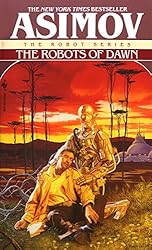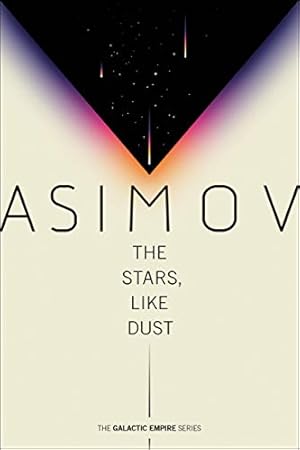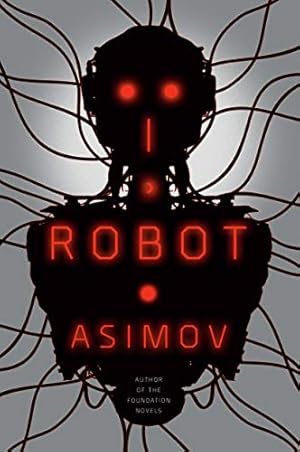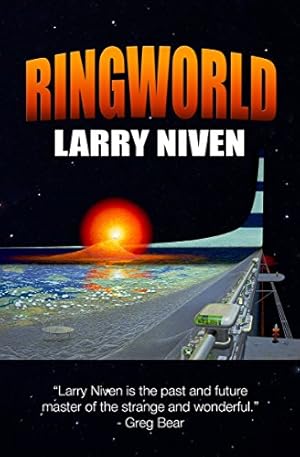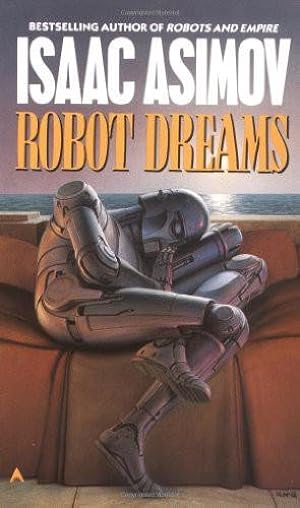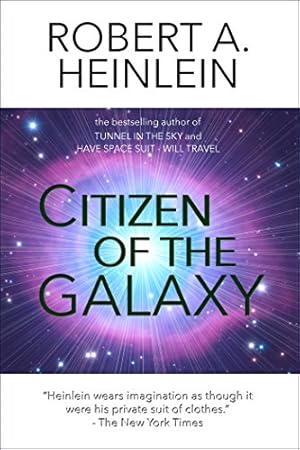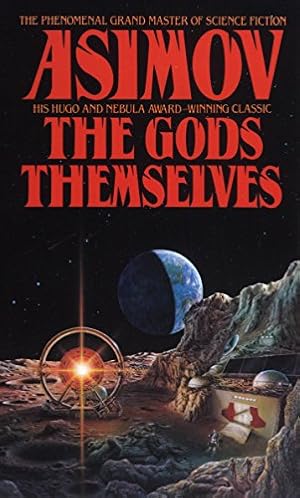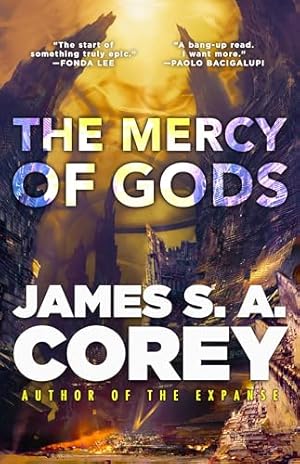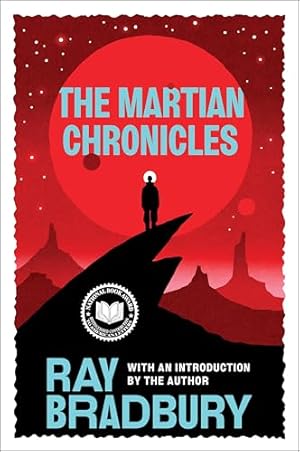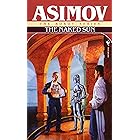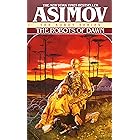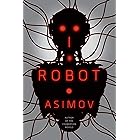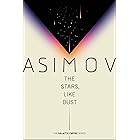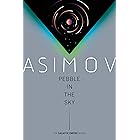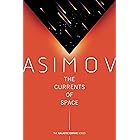| Kindle Price: | $9.99 |
| Sold by: | Random House LLC Price set by seller. |
Your Memberships & Subscriptions

Download the free Kindle app and start reading Kindle books instantly on your smartphone, tablet, or computer - no Kindle device required.
Read instantly on your browser with Kindle for Web.
Using your mobile phone camera - scan the code below and download the Kindle app.



 Audible sample
Audible sample Follow the authors
OK
The Caves of Steel (The Robot Series Book 1) Kindle Edition
Like most people left behind on an over-populated Earth, New York City police detective Elijah Baley had little love for either the arrogant Spacers or their robotic companions. But when a prominent Spacer is murdered under mysterious circumstances, Baley is ordered to the Outer Worlds to help track down the killer.
The relationship between Life and his Spacer superiors, who distrusted all Earthmen, was strained from the start. Then he learned that they had assigned him a partner: R. Daneel Olivaw. Worst of all was that the “R” stood for robot—and his positronic partner was made in the image and likeness of the murder victim!
Shop this series
See full series-
All 3$26.97
-
All 3$26.97
This option includes 3 books.
Customers also bought or read
- Hyperion (Hyperion Cantos, Book 1)#1 Best SellerClassic Science Fiction eBooks
 Kindle Edition$3.99$3.99
Kindle Edition$3.99$3.99 - All Systems Red: The Murderbot Diaries#1 Best SellerCrime & Mystery Science Fiction
 Kindle Edition$4.99$4.99
Kindle Edition$4.99$4.99
Customers who bought this item also bought
 But now, Earthmen are all so coddled, so enwombed in their imprisoning caves of steel, that they are caught forever.Highlighted by 952 Kindle readers
But now, Earthmen are all so coddled, so enwombed in their imprisoning caves of steel, that they are caught forever.Highlighted by 952 Kindle readers “A robot may not injure a human being, or, through inaction, allow a human being to come to harm.”Highlighted by 682 Kindle readers
“A robot may not injure a human being, or, through inaction, allow a human being to come to harm.”Highlighted by 682 Kindle readers (The word “robot” is from a Czech word meaning “compulsory labor.”)Highlighted by 365 Kindle readers
(The word “robot” is from a Czech word meaning “compulsory labor.”)Highlighted by 365 Kindle readers
Editorial Reviews
From School Library Journal
Copyright © Reed Business Information, a division of Reed Elsevier Inc. All rights reserved.
Review
About the Author
William Dufris has been nominated nine times as a finalist for the APA's prestigious Audie Award and has garnered twenty-one Earphones Awards from AudioFile magazine, which also named him one of the Best Voices at the End of the Century.
Excerpt. © Reprinted by permission. All rights reserved.
CONVERSATION WITH A COMMISSIONER
Lije Baley had just reached his desk when he became aware of R. Sammy watching him expectantly.
The dour lines of his long face hardened. “What do you want?”
“The boss wants you, Lije. Right away. Soon as you come in.”
“All right.”
R. Sammy stood there blankly.
Baley said, “I said, all right. Go away!”
R. Sammy turned on his heel and left to go about his duties. Baley wondered irritably why those same duties couldn’t be done by a man.
He paused to examine the contents of his tobacco pouch and make a mental calculation. At two pipefuls a day, he could stretch it to next quota day.
Then he stepped out from behind his railing (he’d rated a railed corner two years ago) and walked the length of the common room.
Simpson looked up from a merc-pool file as he passed. “Boss wants you, Lije.”
“I know. R. Sammy told me.”
A closely coded tape reeled out of the merc-pool’s vitals as the small instrument searched and analyzed its “memory” for the desired information stored in the tiny vibration pattern of the gleaming mercury surface within.
“I’d kick R. Sammy’s behind if I weren’t afraid I’d break a leg,” said Simpson. “I saw Vince Barrett the other day.”
“Oh?”
“He was looking for his job back. Or any job in the Department. The poor kid’s desperate, but what could I tell him? R. Sammy’s doing his job and that’s all. The kid has to work a delivery tread on the yeast farms now. He was a bright boy, too. Everyone liked him.”
Baley shrugged and said in a manner stiffer than he intended or felt, “It’s a thing we’re all living through.”
The boss rated a private office. It said JULIUS ENDERBY on the clouded glass. Nice letters. Carefully etched into the fabric of the glass. Underneath, it said COMMISSIONER OF POLICE, CITY OF NEW YORK.”
“Baley stepped in and said, “You want to see me, Commissioner?”
Enderby looked up. He wore spectacles because his eyes were sensitive and couldn’t take the usual contact lenses. It was only after one got used to the sight of them that one could take in the rest of the face, which was quite undistinguished. Baley had a strong notion that the Commissioner valued his glasses for the personality they lent him and suspected that his eyeballs weren’t as sensitive as all that.
The Commissioner looked definitely nervous. He straightened his cuffs, leaned back, and said, too heartily, “Sit down, Lije. Sit down.”
Baley sat down stiffly and waited.
Enderby said, “How’s Jessie? And the boy?”
“Fine,” said Baley, hollowly. “Just fine. And your family?”
“Fine,” echoed Enderby. “Just fine.” It had been a false start.
Baley thought: Something’s wrong with his face.
“Aloud, he said, “Commissioner, I wish you wouldn’t send R. Sammy out after me.”
“Well, you know how I feel about those things, Lije. But he’s been put here and I’ve got to use him for something.”
“It’s uncomfortable, Commissioner. He tells me you want me and then he stands there. You know what I mean. I have to tell him to go or he just keeps on standing there.”
“Oh, that’s my fault, Lije. I gave him the message to deliver and forgot to tell him specifically to get back to his job when he was through.”
“Baley sighed. The fine wrinkles about his intensely brown eyes grew more pronounced. “Anyway, you wanted to see me.”
“Yes, Lije,” said the Commissioner, “but not for anything easy.”
He stood up, turned away, and walked to the wall behind his desk. He touched an inconspicuous contact switch and a section of the wall grew transparent.
Baley blinked at the unexpected insurge of grayish light.
The Commissioner smiled. “I had this arranged specially last year, Lije. I don’t think I’ve showed it to you before. Come over here and take a look. In the old days, all rooms had things like this. They were called ‘windows.’ Did you know that?”
Baley knew that very well, having viewed many historical novels.
“I’ve heard of them,” he said.
“Come here.”
Baley squirmed a bit, but did as he was told. There was something indecent about the exposure of the privacy of a room to the outside world. Sometimes the Commissioner carried his affection of Medievalism to a rather foolish extreme.
Like his glasses, Baley thought.
That was it! That was what made him look wrong!
Baley said, “Pardon me, Commissioner, but you’re wearing new glasses, aren’t you?”
The Commissioner stared at him in mild surprise, took off his glasses, looked at them and then at Baley. Without his glasses, his round face seemed rounder and his chin a trifle more pronounced. He looked vaguer, too, as his eyes failed to focus properly.
He said, “Yes.”
He put his glasses back on his nose, then added with real anger, “I broke my old ones three days ago. What with one thing or another I wasn’t able to replace them till this morning. Lije, those three days were hell.”
“On account of the glasses?”
“And other things, too. I’m getting to that.”
He turned to the window and so did Baley. With mild shock, Baley realized it was raining. For a minute, he was lost in the spectacle of water dropping from the sky, while the Commissioner exuded a kind of pride as though the phenomenon were a matter of his own arranging.
“This is the third time this month I’ve watched it rain. Quite a sight, don’t you think?”
“Against his will, Baley had to admit to himself that it was impressive. In his forty-two years he had rarely seen rain, or any of the phenomena of nature, for that matter.
He said, “It always seems a waste for all that water to come down on the city. It should restrict itself to the reservoirs.”
“Lije,” said the Commissioner, “you’re a modernist. That’s your trouble. In Medieval times, people lived in the open. I don’t mean on the farms only. I mean in the cities, too. Even in New York. When it rained, they didn’t think of it as waste. They gloried in it. They lived close to nature. It’s healthier, better. The troubles of modern life come from being divorced from nature. Read up on the Coal Century, sometime.”
Baley had. He had heard many people moaning about the invention of the atomic pile. He moaned about it himself when things went wrong, or when he got tired. Moaning like that was a built-in facet of human nature. Back in the Coal Century, people moaned about the invention of the steam engine. In one of Shakespeare’s plays, a character moaned about the invention of gunpowder. A thousand years in the future, they’d be moaning about the invention of the positronic brain.
The hell with it.
He said, grimly, “Look, Julius.” (It wasn’t his habit to get friendly with the Commissioner during office hours, however many ‘Lijes’ the Commissioner threw at him, but something special seemed called for here.) “Look, Julius, you’re talking about everything except what I came in here for, and it’s worrying me. What is it?”
The Commissioner said, “I’ll get to it, Lije. Let me do it my way. It’s—it’s trouble.”
“Sure. What isn’t on this planet? More trouble with the R’s?”
“In a way, yes. Lije. I stand here and wonder how much more trouble the old world can take. When I put in this window, I wasn’t just letting in the sky once in a while. I let in the City. I look at it and I wonder what will become of it in another century.”
Baley felt repelled by the other’s sentimentality, but he found himself staring outward in fascination. Even dimmed by the weather, the City was a tremendous thing to see. The Police Department was in the upper levels of City Hall, and City Hall reached high. From the Commissioner’s window, the neighboring towers fell short and the tops were visible. They were so many fingers, groping upward. Their walls were blank, featureless. They were the outer shells of human hives.
“In a way,” said the Commissioner, “I’m sorry it’s raining. We can’t see Spacetown.”
Baley looked westward, but it was as the Commissioner said. The horizon closed down. New York’s towers grew misty and came to an end against blank whiteness.
“I know what Spacetown is like,” said Baley.
“I like the picture from here,” said the Commissioner. “It can just be made out in the gap between the two Brunswick Sectors. Low domes spread out. It’s the difference between us and the Spacers. We reach high and crowd close. With them, each family has a dome for itself. One family: one house. And land between each dome. Have you ever spoken to any of the Spacers, Lije?”
“A few times. About a month ago, I spoke to one right here on your intercom,” Baley said, patiently.
“Yes, I remember. But then, I’m just getting philosophical. We and they. Different ways of life.”
Baley’s stomach was beginning to constrict a little. The more devious the Commissioner’s approach, the deadlier he thought might be the conclusion.
He said, “All right. But what’s so surprising about it? You can’t spread eight billion people over Earth in little domes. They’ve got space on their worlds, so let them live their way.”
From AudioFile
Product details
- ASIN : B004JHYRAO
- Publisher : Spectra; Reprint edition (April 13, 2011)
- Publication date : April 13, 2011
- Language : English
- File size : 2515 KB
- Text-to-Speech : Enabled
- Screen Reader : Supported
- Enhanced typesetting : Enabled
- X-Ray : Enabled
- Word Wise : Enabled
- Print length : 272 pages
- Best Sellers Rank: #37,687 in Kindle Store (See Top 100 in Kindle Store)
- #11 in Classic Science Fiction eBooks
- #123 in Hard Science Fiction (Kindle Store)
- #262 in Hard Science Fiction (Books)
- Customer Reviews:
About the authors

Isaac Asimov (/ˈaɪzᵻk ˈæzᵻmɒv/; born Isaak Yudovich Ozimov; circa January 2, 1920 – April 6, 1992) was an American author and professor of biochemistry at Boston University, best known for his works of science fiction and for his popular science books. Asimov was prolific and wrote or edited more than 500 books and an estimated 90,000 letters and postcards. His books have been published in 9 of the 10 major categories of the Dewey Decimal Classification.
Asimov wrote hard science fiction and, along with Robert A. Heinlein and Arthur C. Clarke, he was considered one of the "Big Three" science fiction writers during his lifetime. Asimov's most famous work is the Foundation Series; his other major series are the Galactic Empire series and the Robot series. The Galactic Empire novels are explicitly set in earlier history of the same fictional universe as the Foundation series. Later, beginning with Foundation's Edge, he linked this distant future to the Robot and Spacer stories, creating a unified "future history" for his stories much like those pioneered by Robert A. Heinlein and previously produced by Cordwainer Smith and Poul Anderson. He wrote hundreds of short stories, including the social science fiction "Nightfall", which in 1964 was voted by the Science Fiction Writers of America the best short science fiction story of all time. Asimov wrote the Lucky Starr series of juvenile science-fiction novels using the pen name Paul French.
Asimov also wrote mysteries and fantasy, as well as much nonfiction. Most of his popular science books explain scientific concepts in a historical way, going as far back as possible to a time when the science in question was at its simplest stage. He often provides nationalities, birth dates, and death dates for the scientists he mentions, as well as etymologies and pronunciation guides for technical terms. Examples include Guide to Science, the three-volume set Understanding Physics, and Asimov's Chronology of Science and Discovery, as well as works on astronomy, mathematics, history, William Shakespeare's writing, and chemistry.
Asimov was a long-time member and vice president of Mensa International, albeit reluctantly; he described some members of that organization as "brain-proud and aggressive about their IQs". He took more joy in being president of the American Humanist Association. The asteroid 5020 Asimov, a crater on the planet Mars, a Brooklyn elementary school, and a literary award are named in his honor.
Bio from Wikipedia, the free encyclopedia. Photo by Phillip Leonian from New York World-Telegram & Sun [Public domain], via Wikimedia Commons.

Discover more of the author’s books, see similar authors, read book recommendations and more.
Customer reviews
Customer Reviews, including Product Star Ratings help customers to learn more about the product and decide whether it is the right product for them.
To calculate the overall star rating and percentage breakdown by star, we don’t use a simple average. Instead, our system considers things like how recent a review is and if the reviewer bought the item on Amazon. It also analyzed reviews to verify trustworthiness.
Learn more how customers reviews work on AmazonCustomers say
Customers find the story engaging and well-crafted. They describe the book as a compelling read with clear and concise writing. Readers appreciate the intelligent plot and philosophical questions that explore humanity's future. They like the flow of the book and appreciate the author's insight. Overall, customers praise the book as an excellent science fiction classic by an insightful writer.
AI-generated from the text of customer reviews
Customers enjoy the story quality. They find the plot well-crafted, with a small cast and engaging world-building. The book is enjoyable for anyone interested in science fiction, robotics, artificial intelligence, and hardboiled crime drama. The story develops with twists and turns to build suspense.
"...Like all good sci-fi writers, he doesn't lose sight of the story during the process of introducing the reader to the science...." Read more
"...the novel is the way Asimov can visualize, create, and set up with society and world, with the humans, robots, and Spacers...." Read more
"...Always excellent writing and wonderfully crafted plot lines!" Read more
"By definition a classic and justly so...." Read more
Customers find the book engaging and compelling. They describe it as a classic, thought-provoking, and an achievement for its time. The book delivers on all aspects, including characterization, plot, and immersion in the setting.
"I loved this book. It offered a look at an alternate future where overpopulation has fractured man into two camps...." Read more
"...all is forgivable because the book is such an engaging and compelling read in various other ways...." Read more
"...author, dated, and with the prejudices of his times, but he did pretty good here." Read more
"Somehow a perfect straddle of poignantly philosophical and straight up good old mystery solving fun with a great twist...." Read more
Customers appreciate the writing quality. They find the story clear and concise, with good transcribing and proofreading. The book is an easy read from an imaginative and talented author. They appreciate the attention to detail, visualizing society clearly. Readers also like that there are no swear words or profanity in the dialog.
"...Those two take place on two different Spacer worlds, and in some wonderful writing, the differences in those worlds is as dramatic as the difference..." Read more
"...Always excellent writing and wonderfully crafted plot lines!" Read more
"...The story is well developed, and well written...." Read more
"...So. It wasn't terrible, but still. Disliked it for use of dated words and presentations...." Read more
Customers appreciate the book's intelligence and philosophical questions. They find it insightful and engaging, exploring human problems and future possibilities. The author is praised for his vision and skill in bringing human elements to the forefront of his stories.
"...The world-building in this series of novels is very deep and detailed. All citizens of Earth are given the necessities to live, but only just enough...." Read more
"...Likewise, the novel sprinkles in various thinking points and philosophical questions that make for a thought-provoking read...." Read more
"Liked it and appreciated it for its prescience about human problems. Asimov was a visionary. Love the robot stuff...." Read more
"...The man was incredibly intelligent and used the knowledge he gained from his diverse studies to develop intricate worlds with beautiful story telling..." Read more
Customers enjoy the book's pacing. They find it well-crafted and enjoyable as a fast, relaxing read. The story moves quickly and the mystery is solved effectively.
"...The momentum really picks up in the final chapters as we head towards the conclusion...." Read more
"...The book came in perfect condition, no defects or deformations, no printing errors, no upside down pages or anything of the like...." Read more
"...This book is a little more fast-paced and character driven then some of his other stuff, which makes it all the more difficult to put down...." Read more
"I first read this book in 1961 and it holds up well...." Read more
Customers enjoy the book. They find it engaging, fun, and exciting. The story is satisfying, refreshing, and relaxing.
"...all is forgivable because the book is such an engaging and compelling read in various other ways...." Read more
"...This is a refreshing, enjoyable and worthwhile story that reminds me how great Asimov was, and remains." Read more
"...As to the story: this is a fun story, one of my favorites by Asimov...." Read more
"...- a period piece, in many respects - and yet so astonishingly, refreshingly and disturbingly contemporary...." Read more
Customers appreciate the author's writing style and insight into the future. They find the book insightful and a classic by Isaac Asimov. Readers praise the author's prognostications and lack of guesswork.
"...Read it for the ideas and not for the stupid dialog. Asimov was a brilliant man, and this is clearly an early but earnest effort...." Read more
"...Asimov is a great author, and while this book may not necessarily be a classic must read, it is still very enjoyable to anyone interested in Science..." Read more
"...Asimov’s prognostications are also amazing; the use of computers, streaming video files, even a dot pattern similar to today’s QR codes...." Read more
"The best Wi-Fi series ever written by Isaac Asimov. This Wii be the third time reading in 55 years. A best read for ANY Wi-Fi reader." Read more
Customers find the characters interesting and complex. They appreciate the small cast and the narrator's voice for each character. The author's unique classical human innocence is also mentioned.
"...compilation "I, Robot", it was still an excellent story with memorable characters...." Read more
"...in a way that it exemplifies a good story consisting of a small cast of characters...." Read more
"...This book is a little more fast-paced and character driven then some of his other stuff, which makes it all the more difficult to put down...." Read more
"...Not to mention, that the character has so many flaws, he comes across as someone you like only because you're invested, not because he's likable...." Read more
Reviews with images
Here's a photo of my copy of this extremely rare and difficult-to-find book.
Top reviews from the United States
There was a problem filtering reviews right now. Please try again later.
- Reviewed in the United States on August 27, 2019I loved this book. It offered a look at an alternate future where overpopulation has fractured man into two camps. Earthlings never trusted their robot creations, preferring to keep them hidden or out of sight. Spacers embraced robots and looked to them for security and performing all the small tasks to which we're accustomed. The result is that people on Earth have lived in climate-controlled covered cities that sprawl not only above ground but below, and lived there so long that the act of being outside and exposed to nature brings forth anxiety attacks. Earthlings feel safe when they know there's people and walls all around them. Spacers, on the other hand, have taken over 50 other worlds and place more emphasis on privacy and independence, with the unacknowledged exception being their dependence on robots to watch over and protect them.
The world-building in this series of novels is very deep and detailed. All citizens of Earth are given the necessities to live, but only just enough. You get basic food, a place to sleep, and a little bit of access to recreational services. Everyone is classified according to their jobs and contributions, and the higher a classification you have, the more you are entitled to. Higher classifications get better and bigger apartments and a wider selection of food. And with food being served in cavernous cafeterias, sometimes one even gets to occasionally prepare their own meals in their own kitchens, if their rating is high enough. Bathrooms are rarely in the apartments assigned to citizens, and instead are large and sprawling communal areas where different societal norms have taken hold. Women tend to chat and socialize extensively in their "Personals", while men, in an attempt to afford each other privacy, have developed a deep aversion to acknowledging in any way other residents (never look at someone, and never ever speak inside a Personal). The difference between the two sexes almost seems a bit sexist, but in reality just reflects some of the views towards the sexes that exist even to this day. Later books in the series where life is shown on Spacer worlds shatter these conventions and seem foreign to our protagonist. All in all, it's a fascinating background in which the story unfolds.
And the story is a simple murder mystery. Elijah Baley is a detective in NYC's police department. NYC, incidentally, has grown over the centuries, and grown so large that cities like Trenton, NJ are considered boroughs and are part of the enclosed city-structure. There is a settlement of Spacers called Spacertown outside of NYC, and a prominent roboticist has been murdered. This creates a bit of a political crisis. Spacers have advanced their technology and can enforce their will upon Earth and Earthlings, who have been content to just live in their covered cities. Spacers tend to strongly dislike Earth, and there is a very real and substantial fear that Spacers may take control of Earth. Having one of their prominent citizens murdered will only enhance this, and it's up to Detective Baley to resolve this murder. He is assigned a partner in the form of R. Daneel Olivaw, a humaniform robot (one so lifelike it's hard to tell apart from a human). Daneel is one of only two robots in existence who are like this. Baley must get over his inherent dislike of robots that all Earthlings feel and work with Daneel to find the murderer and quell the rising unease between Earth and the Spacers.
Isaac Asimov is not exactly a poet with his writing, but he's very effective and clear and professional, and his world-building is superb. His attention to details draws the reader in and makes for a very effective mystery. Like all good sci-fi writers, he doesn't lose sight of the story during the process of introducing the reader to the science. By the time the story is resolved, the reader does enjoy Baley and Daneel, and has the pleasure of looking forward to reading more about them in the two follow-up stories, "The Naked Sun" and "The Robots of Dawn". Those two take place on two different Spacer worlds, and in some wonderful writing, the differences in those worlds is as dramatic as the difference is between the futuristic Earth of "The Caves of Steel" and our own present Earth. If you enjoy science-fiction that introduces new advanced concepts and worlds and ideas, but still enjoy being not so far removed from our own world that everything is unfamiliar, this is a wonderful story in which to indulge.
- Reviewed in the United States on August 23, 2021“There were some eight hundred Cities on Earth, average population, ten million.
Each city became a semiautonomous unit, economically all but self-sufficient. It could root itself in, gird itself about, burrow itself under. It became a steel cave, a tremendous, self-contained cave of steel and concrete.”
This was my first go and foray into the world of Isaac Asimov, which is a pity because I have been missing out for years. Asimov’s The Caves of Steel is one of the novels in his Robot Series, and the novel’s title is sort of a metaphor to describe the basic structure of these “mega” cities with vast populations. I think most notable about the novel is the way Asimov can visualize, create, and set up with society and world, with the humans, robots, and Spacers. Likewise, the novel sprinkles in various thinking points and philosophical questions that make for a thought-provoking read.
Interestingly, the novel is set up as both a mystery/crime as well as a science-fiction. The basic premise involves veteran New York City police detective Elijah Bailey being assigned the investigation of a suspicious murder of one of the prominent Spacers. As part of the investigation, Bailey teams up with a robot, R. Daneel, to help him search for the suspect and solve the crime.
As mentioned earlier, it is interesting to see how the robots and humans coexist with each other and must live in the same society. We see this in Bailey’s natural distrust and dislike of the robots. His skepticism about his robot partner is one of the conflicts we follow, and this is explored more deeply as we move along in the novel. Bailey’s negative attitude about his fellow robots seems to be a microcosm of angst brewing within the general populace. One key scene early on that illustrates this is a near riot at a store that Bailey and Daneel get called to investigate. Human resentment over robots taking jobs in the work industry is one such factor in this friction.
And, while the mystery itself might be pedestrian (that is, until the final few chapters where the book seems to hit another gear), all is forgivable because the book is such an engaging and compelling read in various other ways. The idea and set up of society that Asimov projects is quite fascinating and imaginative. He spends quite a bit of time giving background and context to how things work and the basic history of where we are. One point illustrating this is when Bailey must cross lines and had into Spacetown with Daneel as part of his investigation. Bailey’s point of view and perspective sheds light on how things operate in Spacetown.
I thought both the science fiction and mystery elements were fused together nicely and worked in tandem with each other. The momentum really picks up in the final chapters as we head towards the conclusion. I also thought it was effective how Asimov does enough to give the book a sense of closure, yet also keeps the door open by setting up the next installment in the series.
- Reviewed in the United States on December 18, 2024I love how you don’t know how things will turn out until the last pages of Isaac Asimov’s last pages! Always excellent writing and wonderfully crafted plot lines!
- Reviewed in the United States on August 7, 2024By definition a classic and justly so. Maybe Asimov is not the smoothest author, dated, and with the prejudices of his times, but he did pretty good here.
- Reviewed in the United States on July 20, 2024Somehow a perfect straddle of poignantly philosophical and straight up good old mystery solving fun with a great twist. A beautiful story about the creation of consciousness all nestled within a tasty pulp scifi mystery treat.
Top reviews from other countries
 Pablo CafisoReviewed in Canada on December 21, 2022
Pablo CafisoReviewed in Canada on December 21, 20225.0 out of 5 stars Fantastic Book!
Typical Asimov work: absolutely amazing. Like all classical books, the language quality is excellent. A great way of cultivating the mind while enjoying a good read.
-
 TobiaReviewed in Italy on November 26, 2024
TobiaReviewed in Italy on November 26, 20245.0 out of 5 stars Regalo apprezzato
Ho regalato questa versione del libro ed è stata molto apprezzata sia per la rilegatura che per lo stile ASIMOV vintage. Consigliato per chi ama il genere e vuole avere un pezzo da collezione.
-
 Claudio E MatrajtReviewed in Brazil on July 26, 2020
Claudio E MatrajtReviewed in Brazil on July 26, 20205.0 out of 5 stars excelente libro
Libro nuevo
-
 Diana RojasReviewed in Mexico on July 17, 2020
Diana RojasReviewed in Mexico on July 17, 20205.0 out of 5 stars Amazing, I couldn't stop reading
Me encantó! El libro no tiene suficientes páginas, la forma de escribir de Asimov es tan fluida que uno se pierde en la historia.
P.D. El libro llegó en excelentes condiciones y en el tiempo programado :)
-
 TeresaReviewed in Germany on May 10, 2021
TeresaReviewed in Germany on May 10, 20215.0 out of 5 stars Schnelle Lieferung, tolles Buch!
Ich habe das Buch extra bei einem anderen Händler bestellt (preigo), damit es schneller kommt, und habe dafür auch ein paar Euro mehr ausgegeben. Die Lieferung kam sogar einen Tag eher als angekündigt. Toll!
Das Buch ist großartig - wie alles von Azimov. Großer Fan!








